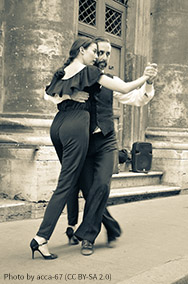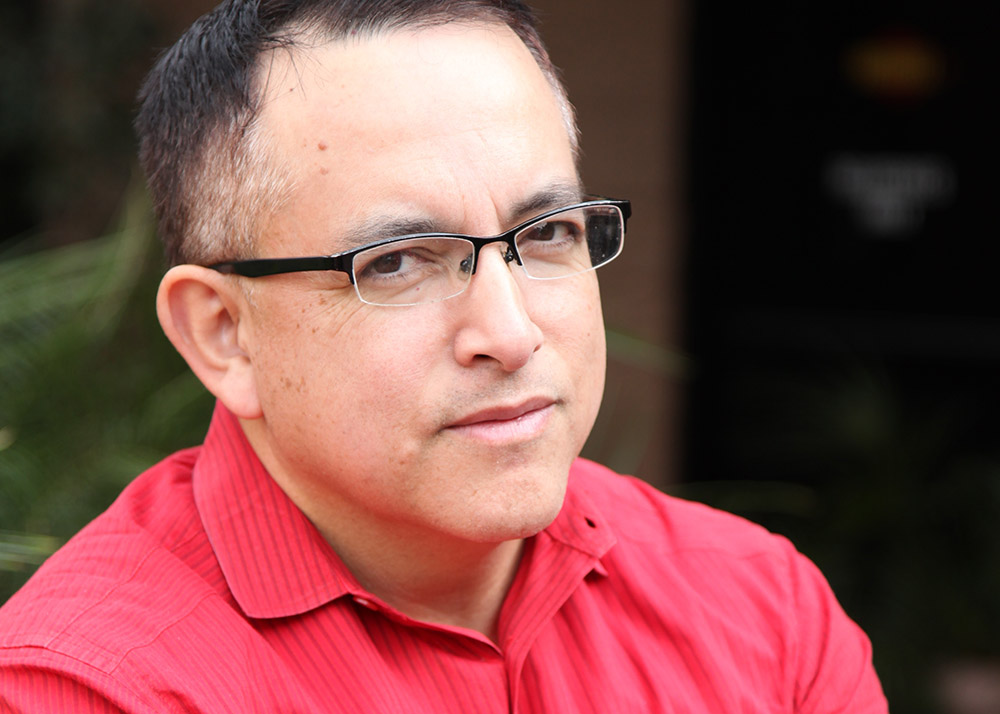A conversation with Guillermo Reyes
We sat down with Valentino and the Chilean Heiress playwright Guillermo Reyes. Guillermo is no stranger to the Milagro stage, you might remember Deporting the Divas (1999), Men on the Verge or a His-Panic Breakdown (1999), Sirena Queen of the Tango (2003), and Men on the Verge 2 (2005).
Here’s what he had to say about Valentino and the Chilean Heiress and more.
Tell us about Valentino and the Chilean Heiress?
Valentino and the Chilean Heiress dramatizes the relationship between the young Rudolph Valentino when he was a struggling dancer and before he became a film star with the wealthy Chilean socialite, Blanca De Mille (fictionalized name), a woman who shot her husband to death after a messy divorce and custody battle. The story’s told in a stylized tango-infused style in which the characters perform the tango as a means to advance the story and express major moments of conflict.
How did it come about, what inspired it?
Inspiration’s all over the place. Perhaps it’s just that I’m a Chilean-American drama queen who has absorbed the tango though I can’t dance it myself but has always sought to create a tango drama because the dance itself just seems like a form of Latin American noir. I feel that I have lived it somehow and it expresses my self-dramatizing qualities. I found the tango drama in this true story of the young Valentino and the affair he had with a woman who should have become the love of his life, but didn’t. I’ve read a couple of Valentino biographies and this story spoke to me because I sensed that Blanca’s background spoke to my own Chilean immigrant story. My mother was never wealthy and clearly wasn’t this type of murderous society woman, but nonetheless her relationship to her son who emerges as the narrator touches upon some aspects of the dynamics of a divorced or single mother struggling to do what’s best for her child. And then you do the tango some more. How could I resist? And Astor Piazzola’s tangos are the ones I was primarily thinking of when I wrote those sections.
 I lived in Italy when I was young when I was part of the education abroad program from UCLA, and the Valentino story and his films have been part of my life along with Italian culture and language. The fact that Valentino had a relationship with a Chilean woman in the United States brought my own cultural journeys together in a way that no other story had before. I enjoy the idea of demystifying iconic figures like Valentino and understanding the man, where he came from and what his struggles as a mostly broke Italian immigrant were. That he was a dancer and that he did the tango in one of his most famous films, The Four Horsemen of the Apocalypse, also infused the story with the Latin American tango background that became part of my life as well. Tango’s part of my roots, you might say, and that Valentino danced it so famously made me embrace his personality and myth.
I lived in Italy when I was young when I was part of the education abroad program from UCLA, and the Valentino story and his films have been part of my life along with Italian culture and language. The fact that Valentino had a relationship with a Chilean woman in the United States brought my own cultural journeys together in a way that no other story had before. I enjoy the idea of demystifying iconic figures like Valentino and understanding the man, where he came from and what his struggles as a mostly broke Italian immigrant were. That he was a dancer and that he did the tango in one of his most famous films, The Four Horsemen of the Apocalypse, also infused the story with the Latin American tango background that became part of my life as well. Tango’s part of my roots, you might say, and that Valentino danced it so famously made me embrace his personality and myth.
How long have you been working on it?
The story and the idea has been percolating in my mind for a couple of years but I was fortunate enough to have a sabbatical from my job as dramatic writing professor from Arizona State University, and I received a Bogliasco Foundation residency that allowed me to live in Genoa, Italy for five weeks with fellow artists in March–April of 2017. I thought I would start working slowly on some scenes and absorb the Italian spirit. Valentino was actually a student in Genoa and embarked from there to the United States as a young man. But I also tripped on the streets of Genoa and broke my foot, which means that I spent most of my residency walking around on an orthopedic shoe trying to heal and my partial immobility led me to spend more time indoors and write the entire play in a couple of weeks. I’ve done rewrites since, but most of the play as it is today was written in a quick blitz in late March after my foot cracked in Italy.
What was your hardest scene to write and why?
Not one scene, but various elements. For instance, I’ve never written tango before into scenes, so I had to describe them hoping the choreographer will make sense of them. I am not a choreographer so I’d have to rely on the talent and ingenuity of one. Furthermore, my writing of lyrics is yet one more thing I’ve had to develop. In a recent show (which I’ll describe below to answer that question), I felt the need to write a bunch of songs even though it’s not a musical. It’s a play with music, and Valentino and the Chilean Heiress clearly had to express itself with music, song and dance. I wrote the songs for this show as well, in other words, and it’s a new skill set for me. The show has four songs that I wasn’t expecting to write.
Are you working on anything else now?
Yes, to expand on what I mentioned above. Hit Music tells the story of a family of Italian-Peruvian-Americans in the Valley in L.A. in the 1990s. This ethnically and nationally and linguistically mixed family features a stubborn Italian father who sings in Italian, a wife who speaks Spanish, and kids who’ve been brought up in L.A. and want to do pop and rock ‘n roll in English. It’s a delightful mix of generational musical conflict and a big sing-off happens at the end and a bunch of songs emerged out of it. I was expecting to work with one composer, but I’ve done two workshops thanks to a generous grant from ASU’s Herberger Institute, and two of my actors who are singers and musicians themselves urged me to let them compose their own music. I was delighted by their ingenuity and initiative. Since I had never written lyrics before, I had a crash course in the dynamics of writing and rewriting lyrics as we set them to music. For the first time in my life, I heard my lyrics being sung and then I became addicted to the process. I did two different workshops after all, one in 2016 and another earlier in 2017. When I sat down to write Valentino…, I had developed the skill further and I don’t think I could have written songs for this new show if it weren’t for the previous show, Hit Music. On the side I’ve been writing yet another show that uses a bunch of songs, but I’m not ready to discuss that one yet.
Do you have any advice for emerging Latina/o playwrights?
Advice, no! Young writers don’t listen to me when I tell them to read books from all over the canon, even things they may not normally read like anthropology and biology. We get stuck in the humanities reading about other writers and often don’t get outside of ourselves. We definitely should read Shakespeare and the Greeks, but aside from that find inspiration in things that you love. If it’s comics, go there, and if it’s Game of Thrones, do that. I feel like in the past I’ve wasted time trying to write what I thought were the academically acceptable styles—the isms, surrealism, magical realism, etc. Don’t discard them either. You might find your voice in an “ism.” But don’t adapt it unless you feel it’s you. I bring a lot of my South American roots into my work, but I have also absorbed the Southwest and Chicano culture, queer culture, and other concepts, and I have no problem with watching great TV (Breaking Bad, GoT, and what have you) and I’ve drawn inspiration from some great songwriters like Bob Dylan and Bruce Springsteen, and the Chilean ones like Violeta Parra and Victor Jara. I say use it all and I say don’t discard anything that brings you joy.
For whatever reason, I googled Dylan Thomas and absorbed his poem, “Do not go gentle into that good night” for no other reason that I enjoy his word play and the content of not going into the darkness without kicking and screaming. I felt the need to read it again and I feel that way about all sorts of things.
Who have been your playwriting mentors and heroes?
OK, nothing against mentors and heroes. But I’d prefer to think in terms of influences like the Federico Garcia Lorca mystique (and the way a filmmaker like Carlos Saura set Blood Wedding to flamenco dance, now that’s dope), the Pedro Almodovar aesthetics which include a strong dark sense of humor with eroticism, and some great classic movies (Joseph Mankiewicz’s screenplay for All About Eve is great writing, for instance) along with Shakespeare and the Greeks, and all the rest. Just too many to list.
Why is theatre important today?
The arts are important in general. Theater’s part of it. A live theatrical experience has the power to change your life, but I also like to think that’s because theater can absorb the literary (the writing) along with the spectacle which music and dance can bring to it, along with the visuals of design, not to mention the great charisma and beauty that actors and dancers and singers can provide. I’m not sure we can separate one from the other.
What do you do outside of theatre?
Weights. I lift weights and run half marathons when and if the Phoenix weather isn’t ready to kill me during the summer. I had to take a few months off from running when I broke my foot, but I’m up and running again.
How do you decompress?
I decompress?
VALENTINO AND THE CHILEAN HEIRESS
Concert-style reading followed by a feedback session
Friday September 8, 2017 at 7:30 PM
Admission: FREE
Read more about Valentino and the Chilean Heiress and the other INGENIO Play Fest selections, September 8–10, 2017 at Milagro.

